Quick Takes of the Week to April 4
In case you missed it: News bites for the week.
In case you missed it: News bites for the week.

Leighton Evans.
South Island charity Rātā Foundation has announced its purchase of a 25% stake in investment firm Alvarium for an undisclosed sum.
The transaction is split 50/50 into a selldown by the owners of Alvarium (NZ) Wealth Management Holdings – predominantly interests associated with Christchurch NBR Lister Ben Gough – and the issue of new shares.
Rātā chief executive Leighton Evans said the deal was the Foundation’s first direct investment in a private New Zealand company.
“In line with its strategic goals, our private market strategy will bring us closer to our investments, ensuring a clearer alignment between our purpose and the funds we manage,” he said.
Rātā’s total investment portfolio was valued in 2024 at $685.4 million, predominantly invested in funds recommended by its adviser Mercer.
Of that, $80.5m was invested in private equity funds and $34.3m in private debt.
Rātā said it had also recently invested $10m in a trans-Tasman equity fund managed by Alvarium subsidiary Pathfinder.
Fonterra Co-operative Group has appointed Liz Coutts as the chair-elect of Mainland Group, the proposed divestment entity of Fonterra’s global Consumer business. If there is an initial public offering for Mainland, Coutts would be the non-executive chair of the board, and in charge of the growth strategy.
Coutts is also chair of ASX and NZX-listed companies Ebos Group and Oceania Healthcare, as well as telecommunications company Two Degrees.
"She brings extensive governance experience from both large private and public companies, and her leadership will be invaluable should we pursue a public listing for Mainland Group,” Fonterra chair Peter McBride said.
Fonterra is pursuing either a trade sale or IPO as potential divestment options for its global Consumer and associated businesses.
Over the coming weeks, it will assess non-binding indicative offers from potential purchasers and has recently completed meetings with prospective investors as part of the IPO process.
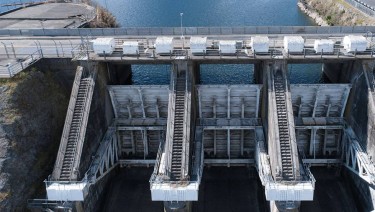
Manawa Energy Matahina Power Station.
The Commerce Commission has delayed its decision on whether to grant clearance for Contact Energy's purchase of hydro generator Manawa.
Last September, Contact announced a deal to buy Manawa for a mix of cash and shares valuing Manawa at $5.95 a share, or $1.86 billion.
But in February, the competition regulator said it was not yet satisfied the deal would not have, or would not be likely to have, the effect of substantially lessening competition in New Zealand.
A decision was due on Monday but in a statement to the NZX Contact said the ComCom had extended its deadline to May 9.
“The facts and supporting evidence before the Commission meet the legal test for clearance to be granted under the Commerce Act. Importantly, this acquisition would support the renewable energy transition by providing more of the types of contracts needed by New Zealand businesses and for retail competition,” said Contact CEO Mike Fuge.
Gentrack Group has said it continues to comply with continuous disclosure obligations, after the NZX market regulator asked it to explain a more-than 10% rise in its share price last Friday.
In a letter from NZ RegCo to the company dated March 28, but just published to the market, the regulator asked the utilities-related software company to disclose any material information that might have provoked the valuation rise, in line with NZX Listing Rule 3.1.1.
Gentrack's CFO John Priggen responded in a letter dated March 31 that the company "confirms that, as at the date of this response, it continues to comply with its continuous disclosure obligations under NZX Listing Rule 3.1.1".
Gentrack's shares closed $1.13 higher on Friday than at Thursday's close – or nearly 11% up.
The NZ Herald recently reported speculation that a job advertisement for an analyst to work with Bulgaria’s largest energy supplier and distributor might indicate a major new contract for the company.
 Listed food box delivery company My Food Bag says its second-half revenue for the 2024 financial year is up 5% on the previous year.
Listed food box delivery company My Food Bag says its second-half revenue for the 2024 financial year is up 5% on the previous year. Changes are being made to the Health and Safety at Work Act to make it clear landowners are not responsible if someone is hurt engaging in recreational activity on their land. Workplace Relations and Safety Minister Brooke van Velden said she did not think it was reasonable or proportionate for landowners to be prosecuted by WorkSafe if someone was hurt during recreational activity just because they were responsible for the land. “Landowners will not be responsible if someone is injured on their land while doing recreational activities. Health and safety responsibilities will lie squarely on the organisation running the activities,” van Velden said. She said the law change would apply to both public and private land, and it would still be up to private landowners to provide access if they wished. The law changes would be introduced later this year and come into effect in 2026.
Changes are being made to the Health and Safety at Work Act to make it clear landowners are not responsible if someone is hurt engaging in recreational activity on their land. Workplace Relations and Safety Minister Brooke van Velden said she did not think it was reasonable or proportionate for landowners to be prosecuted by WorkSafe if someone was hurt during recreational activity just because they were responsible for the land. “Landowners will not be responsible if someone is injured on their land while doing recreational activities. Health and safety responsibilities will lie squarely on the organisation running the activities,” van Velden said. She said the law change would apply to both public and private land, and it would still be up to private landowners to provide access if they wished. The law changes would be introduced later this year and come into effect in 2026.
Christian Hawkesby.
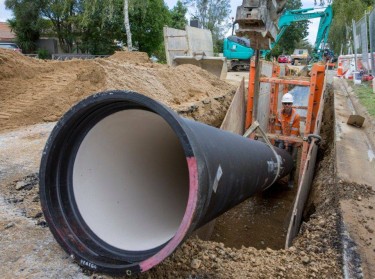 Northland’s water infrastructure is set for a $41.5m boost from the Government’s Regional Infrastructure Fund, with loans backing two pipeline projects designed to unlock thousands of hectares for horticultural development and improve regional productivity. The 15km Otawere extension and 22km Kaipara pipeline will improve water security across the Mid Far North and Kaipara, including supply to Silver Fern Farms, the area’s largest employer.
Northland’s water infrastructure is set for a $41.5m boost from the Government’s Regional Infrastructure Fund, with loans backing two pipeline projects designed to unlock thousands of hectares for horticultural development and improve regional productivity. The 15km Otawere extension and 22km Kaipara pipeline will improve water security across the Mid Far North and Kaipara, including supply to Silver Fern Farms, the area’s largest employer.Whole milk powder held steady overnight after recent price gains and declines at the dairy auction. The price fell just 0.1% to US$4062 per tonne, while the broader GDT index increased to US$4250, with a mix of increases and declines across other commodities on offer. Last month, dairy co-operative Fonterra lifted its FY25 earnings guidance from 40-60 cents per share to 55-75 cents per share. Chief executive Miles Hurrell said this reflected strength in its core ingredients business, in particular. “Our consumer channel has shown good volume and margin growth while recovering the higher Farmgate Milk Price this season.” In the six months to January, Fonterra’s net profit was $729m, up from $674m a year earlier. Revenue rose 14% to $12.59b.
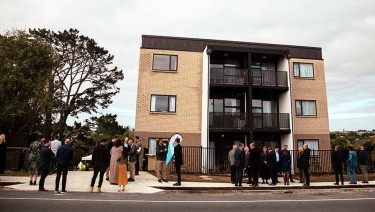
CORT community housing.
The Labour Party blames the Government for a material slowdown in building consents and the loss of construction jobs. Statistics NZ data today showed there were 33,595 new homes consented in New Zealand in the year ended February, down 7.4% compared with the previous year. Labour housing and infrastructure spokesperson Kieran McAnulty said the Government should take some of the blame for that. “A lack of certainty around funding has also contributed to stagnating community housing, so the pace of builds isn’t meeting need. The Government has only funded 1500 new social housing places from July 2025. The Government has also reintroduced interest deductibility, which removes the incentive for the private sector to invest in new builds,” he said. Economists expect the economic recovery to increase new building activity and job creation this year.
Milk processor Synlait says a “significant majority” of ‘cease supply’ notices have now been withdrawn by suppliers.
The company said strengthening its milk supply was a key priority after a significant number of its farmer suppliers gave notice last May of ceasing supply with the processor.
Acting chief executive Tim Carter said today there was a rise in cease withdrawal numbers after it presented its half-year results last month.
“With competition for milk growing in Canterbury, Synlait is committed to continuing to show farmers why we should remain a processor of choice.”
Farmers could still qualify for a one-off additional 20c per kilo of milk solids premium by withdrawing cease notices by May 31.
Last month, Synlait reported a net profit of $4.8m in the six months ended January, up from a loss of $96.2m a year earlier. Revenue grew 15.5% to $916.8m.
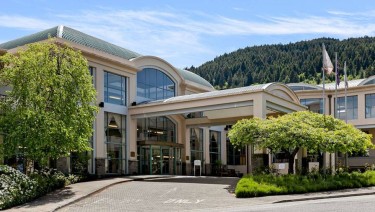
Millennium & Copthorne Queenstown.
Millennium & Copthorne stalwart Kenneth Orr will step down as vice-president of operations for the hotel group, effective June 30, the company said. The decision had been made for family reasons and Orr is understood to be relocating to Central Otago. Orr, who has worked for the NZX-listed company for more than 20 years, had 19 hotel general managers reporting to him. Managing director Stuart Harrison said the company would be keen to retain Orr's services, as he is a highly valued member of the management team. The company's main property in Queenstown, its 220-room Millennium Hotel is nearing completion of its refurbishment project. Harrison said the 240-key Copthorne, across Frankton Road, was next on the refit agenda. Part of that hotel was currently being used for staff accommodation. MCK also owns the Kingsgate brand in the South Island.
The Government’s financial performance continues to track better than forecast in Treasury’s December Half-year economic and fiscal update.
In the eight months to the end of February the operating balance before gains and losses, and excluding ACC, (Obegalx) recorded a deficit of $5b, $1.6b smaller than forecast. The old measure of Obegal, which includes ACC, recorded a deficit of $6.6b, $1.4b less than expected. When investment gains and losses were included, the deficit was just $800m, $$2.6b lower than forecast. The better result was because of net favourable valuation movements, while net losses on financial instruments were $1.6b lower than expected. Higher-than-expected tax revenue and lower spending contributed to the better outcome. Net core Crown debt was also lower than forecast at $181b, or 42.4% of GDP. Meanwhile, net worth was higher at $187.6b.
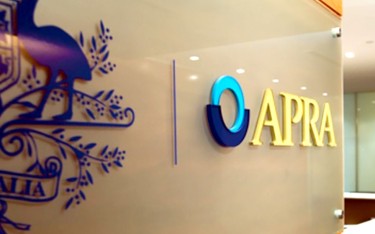 Banking group ANZ has bowed to the Australian Prudential Regulation Authority and entered into a court enforceable undertaking to improve its non-financial risk management and provide an additional capital overlay of A$250m ($274m).
Banking group ANZ has bowed to the Australian Prudential Regulation Authority and entered into a court enforceable undertaking to improve its non-financial risk management and provide an additional capital overlay of A$250m ($274m).
Apra has been critical of non-financial risk management in ANZ’s Global Market’s business and cultural issues which saw sackings, suspensions and formal warnings to team members last year.
The bank has been under scrutiny over its trading in Australian government bonds, and claims that it manipulated wholesale interest rates.
ANZ chair Paul O’Sullivan today said the bank was “disappointed” not to have met Apra’s expectations, and agreed an independent reviewer would look into the ANZ’s risk culture.
Tower crane sightings across the New Zealand skyline have dipped by 33% to 105, from a high of 157 in early 2023, according to the latest Rider Levett Bucknall (RLB) crane index. The biannual index, as a barometer of construction activity, recorded 19 fewer over the past six months alone. The most pronounced decline over that period was in Auckland, which saw a 23.5% drop to 52 cranes. RLB counted 20 cranes in Christchurch, 13 in Tauranga, eight in both Dunedin and Queenstown, with another five in Wellington and two in Hamilton. RLB Auckland managing director Steve Gracey said the index reflected the "significant challenges" being faced by the sector. The Government's review of capital works spending across education, health, and social housing sectors during the high inflation environment was being borne out by a "scarcity of on-site projects," he said. Consents also fell by $1.5 billion, a drop of 5.1% last year, almost entirely due to the drop in new residential builds.
 Telecommunications company Two Degrees has been fined $325,000 by the Auckland District Court after admitting it made misleading claims that its Australian business roaming was “free” or “at no extra cost” when, in fact, customers were charged for roaming after only 90 days. Claims made by Two Degrees in a widespread advertising campaign between 2020 to 2023 created an impression that customers on mobile business plans would have the ability to roam year-round in Australia at no extra cost. In fact, the ‘free’ roaming was capped at 90 days each year and, if customers exceeded that, they would be charged $7 to $8 per day of additional roaming. It pleaded guilty to five breaches of the Fair Trading Act and refunded customers who were charged for roaming.
Telecommunications company Two Degrees has been fined $325,000 by the Auckland District Court after admitting it made misleading claims that its Australian business roaming was “free” or “at no extra cost” when, in fact, customers were charged for roaming after only 90 days. Claims made by Two Degrees in a widespread advertising campaign between 2020 to 2023 created an impression that customers on mobile business plans would have the ability to roam year-round in Australia at no extra cost. In fact, the ‘free’ roaming was capped at 90 days each year and, if customers exceeded that, they would be charged $7 to $8 per day of additional roaming. It pleaded guilty to five breaches of the Fair Trading Act and refunded customers who were charged for roaming.
“Businesses need to consider the overall impression of headline claims. Key information about claims they’re making needs to be easy to find and not buried in the fine print,” Commerce Commission deputy chair Anne Callinan said.
Commodity prices edged slightly lower in March, with only beef, butter, and cheese recording gains, according to the ANZ World Commodity Price Index.
The index declined 0.4% last month, compared with the 3% gain recorded in February.
Global shipping prices were still mixed, while dairy prices fell 0.8%, as key export commodity whole milk powder slipped 2.5% last month.
ANZ chief economist Sharon Zollner said uncertainty around tariff implementation and retaliation would be a major theme this year.
“What is working in our favour is a still low New Zealand dollar, strong production relative to most other regions, and China’s announced stimulus efforts to support domestic household consumption.”
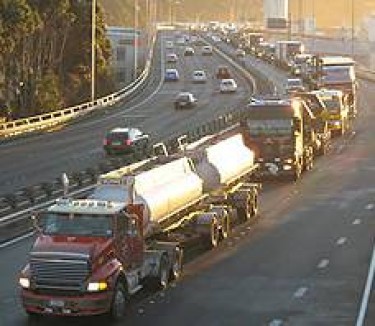 New vehicle sales showed further signs of stabilisation in March, with 11,920 registrations, up 2.6% on the same month last year, the Motor Industry Association says.
New vehicle sales showed further signs of stabilisation in March, with 11,920 registrations, up 2.6% on the same month last year, the Motor Industry Association says.
The Ford Ranger was the best seller last month, followed by the Toyota Rav4, Toyota Hilux, Mitsubishi Triton, and Nissan Navara.
Chief executive Aimee Wiley said light passenger vehicles now accounted for the majority of registrations, supported by “resilient” consumer demand, while the commercial sector was still under pressure.
Light commercial registrations fell 8.7% compared with March last year, while heavy commercial volumes declined 39%.
“Rather than expanding fleets, operators appear to be focusing on utilisation and efficiency, managing through a period of softer demand,” Wiley said.
Infratil has revalued its 48.2% investment in Australasian data centre company CDC upwards by more than A$1.6 billion ($1.8b), or about 34%, according to an NZX disclosure today.
The company said the primary valuation method applied by an independent valuer had been changed from discounted cashflow to historical transaction, after CDC shareholder CSC agreed to sell its 12% stake in February.
Infratil is set to acquire approximately 1.58% of CDC’s ordinary shares for about A$216 million, with Future Fund acquiring the remaining 10.46%. Its stake will rise to 49.75%.
The share sale and change in methodology implies Infratil’s stake is now valued between A$6,066m and A$7,208m, with a midpoint of A$6,600m, up from A$4,485m to A$5,385m, with a midpoint of A$4,924m, at the end of December 2024.
Completion of the share buy is subject to Australia’s Foreign Investment Review Board approval, and is expected in the second half of 2025.
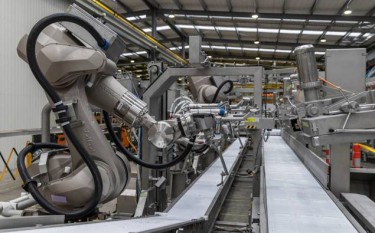
Scott Technology JBS Canada.
Scott Technology believes tariffs announced by the United States will have "limited impact" on its business in the current financial year, and that just 10% of its current revenue mix would be exposed to them.
The NZX-listed robotics company told the market this afternoon that much of its North American revenue is from Canadian customers in its mining and materials handling business, and that some of its US revenue was "insulated from tariffs due to Scott’s United States manufacturing base".
Forsyth Barr analysts agreed, viewing any implications as "relatively minor", and saying they estimate only 6-8% of Scott’s total sales will have some tariff attached. It would be "assisted by a high percentage of in-country service (~28% of total sales) and the Materials Handling segment being insulated from tariffs due to its predominantly US manufacturing base". Both the company and the analysts acknowledged that weaker global demand presented a broader, second-order headwind of the tariffs.